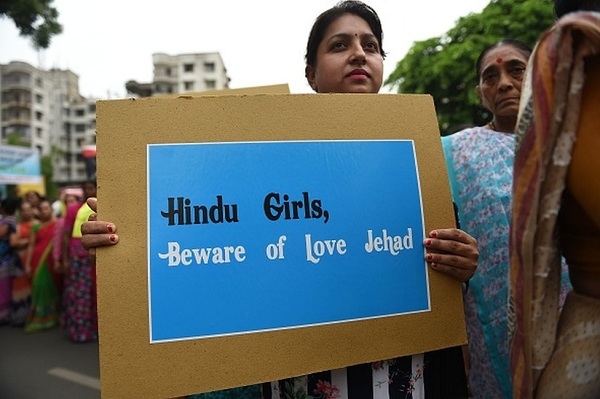The 'Other' Myths of Anti-Love Jihad Law
Total Views |
-Anjali Ankad
With Uttar Pradesh enacting the Prohibition of Unlawful Religious Conversion Ordinance, 2020, it has raised a "political" storm and misguided the mass. Apart from them, a few BJP state governments including Madhya Pradesh, Haryana, and Karnataka are coming forward to enact laws prohibiting conversions merely for the purpose of marriage have raised quite a political storm. The Opposition who has created this storm has obviously brought out controversial measures. This has led to misleading people and these myths have clouded the facts and legal aspects in the process.

Myth 1: The laws criminalize the interfaith marriages
No, it does not. Interfaith marriages can take place and there is no prohibition enacted in the Uttar Pradesh Prohibition of Unlawful Religious Conversion Ordinance, 2020. The interfaith marriages can take place under the Special Marriage Act, 1954 (SMA) – a law enabling marriages to be recognized in India outside the context of religious laws. Indeed, the SMA does not literally involve religious conversion and can apply in inter-caste and inter-religion marriages.
The Law enacted by Uttar Pradesh prohibits religious conversion through "misrepresentation, force, undue influence, coercion, allurement, fraudulent means or by marriage". In case of violation of that prohibition, a complaint can be filed by an affected party or a relative. The proposed punishment is minimum imprisonment of a year which may extend to five years. In cases involving a minor, woman, or individual belonging to Scheduled Castes or Scheduled Tribes, the punishment is greater.
A party to a marriage desirous of converting is required to provide a declaration to the relevant authorities one month in advance that the said conversion is of his/her free will. The district magistrate shall conduct an inquiry in regard to the intention, purpose, and cause of the proposed conversion. Indeed, rules issued in furtherance of this process shall elaborate it further.
However, the mainstream media without having any knowledge of the legal aspects of the Law. They are busy running the agenda saying that interfaith marriages will be severely affected due to this law.
Myth 2: BJP is the only political party to enact bills prohibiting conversions
The Congress-ruled government in Himachal Pradesh in 2006 had updated an earlier anti-conversion law, increasing the quantum of punishment and adding new provisions, including one which was earlier struck down by the high court. Among the eight new provisions added in the Himachal Pradesh Freedom of Religion Bill 2019 is one that covers marriage done with the sole purpose of conversion. “Any marriage done for the sole purpose of conversion by a person of one religion with a person of another religion either by converting himself before or after marriage or by converting the other person before or after marriage may be declared null and void by the family court,” reads Section 5 of the Act.
Despite these facts, the Congress party, which is now outraging against these laws, unanimously voted in favor of that law in the Assembly.
This is not the only state. The Swatantra Party government in Odisha in 1968 and the AIADMK government in Tamil Nadu in 2002 (later repealed by the DMK government in 2006) enacted laws prohibiting conversion on many of the conditions mentioned in the 2019 draft bill proposed by the UP State Law Commission.
It is also vital to note that Uttarakhand enacted an identical law in 2018. Though the ruling party was BJP at that time, the law came into action after the Uttarakhand High Court asked the state to frame a ‘Freedom of Religion Act’ on the lines of the Madhya Pradesh Freedom of Religion Act, 1968 as well as Himachal Pradesh Freedom of Religion Act, 2006, saying that "it has come to our notice that the conversion from one religion to another is often a sham conversion only to facilitate the process of marriage."
Myth 3: Due to this law, one is not able to convert to another religion
Under the new proposed law, anyone wanting to convert into another religion would have to give it in writing to the District Magistrate at least two months in advance. The government is supposed to prepare a format for the application and the individual has to fill the application for conversion in that format.
However, under the new law, it would be the responsibility of the one going for the religious conversion to prove that it is not taking place forcefully or with any fraudulent means. In case, any violation is found under this provision, then one faces a jail term from 6 months to 3 years and a fine of a minimum of Rs 10,000.
Myth 4: The law violates the fundamental freedom under Article 25 of the Constitution to practice and propagate religion
First of all, Article 25 says, "all persons are equally entitled to freedom of conscience and the right to freely profess, practice, and propagate religion subject to public order, morality and health." It clearly states that it does not include any conversion of religion. Indeed, it does not have any relation to conversion.
Myth 5: The law states that the conversions happen merely for the purposes of marriage
This myth ignores that there are several high courts and even the Supreme Court who has stated that they do not accept the conversions which happen merely for the purposes of marriage. The Allahabad High Court has said that religious conversion is not acceptable if it happens just for the purpose of marriage.
Even, in 2014, Allahabad High Court had noticed that the question of whether conversion of religion by a Hindu girl at the instance of a Muslim boy, without any knowledge of or belief in, Islam merely for the purpose of marriage was valid. Interestingly, the Akhilesh Yadav government, which was in power back then, took a stand that conversion merely for marriage was not permissible as this was neither a valid religious conversion nor a valid Nikah.
The Calcutta High Court stated that if a conversion is not inspired by the religious feeling and undergone for its own sake, but is resorted to "merely with the object of creating a ground for some claim of right, a court of law cannot recognize it as a good basis for such claim but must hold that no lawful foundation of the claim has been proved". It also added that where conversion gives a legal right, to go through a mock conversion and set it up as a basis of that right "is to commit a fraud upon the law".
In addition to this, it should be noted that before formulating the law, various reasons have been reported whereby the victim is forced to convert her religion. After a systematic study, it was known that most of the cases of 'Love jihad' fall under the issue because the victim is misinformed about the marriage law and is misguided to convert her religion for lawful approval of her marriage.

However, with the new law, such practices where the victim is misguided to convert her religion have been targeted and lawful action will be taken against such individuals. However, the law nowhere states that all religious conversions after marriage are to be counted as cases of Love Jihad. There are certain parameters as mentioned above that the law suggests to authenticate the act of conversion as willingly or as a violation of the converted individual's fundamental rights.
Therefore, the UP Bill as well as the laws in Himachal Pradesh and Uttarakhand follows what the constitutional courts of India have held for decades.

